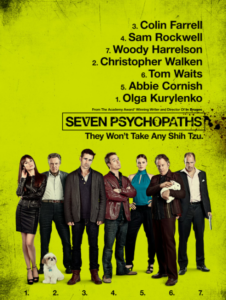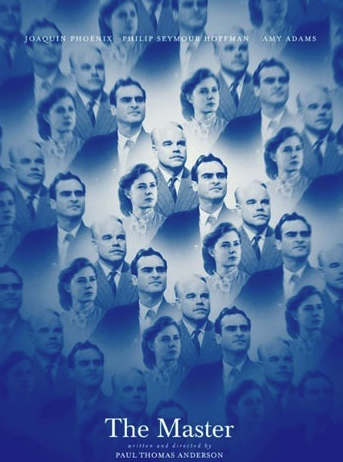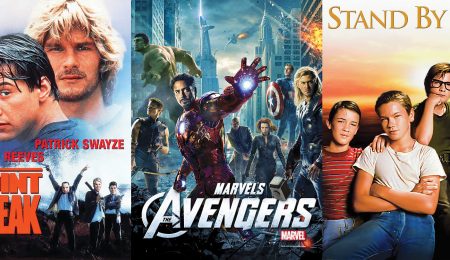Seven Psychopaths
5 / 5
 SEVEN PSYCHOPATHS RANKS among the best films of this year. The film reunites director Martin McDonagh with lead actor Colin Farrell after 2008’s In Bruges, and also features Sam Rockwell, Christopher Walken, Woody Harrelson, and Abbie Cornish.
SEVEN PSYCHOPATHS RANKS among the best films of this year. The film reunites director Martin McDonagh with lead actor Colin Farrell after 2008’s In Bruges, and also features Sam Rockwell, Christopher Walken, Woody Harrelson, and Abbie Cornish.
The plot follows an alcoholic screenwriter (Farrell) who’s trying to come up with his next project while dealing with his floundering relationship. He’s helped and hindered by his best friend, an out-of-work actor (Rockwell) who helps run a scam to steal people’s dogs and return them for the reward. But when they steal the beloved dog of a hot-tempered gangster (Harrelson), things get out of hand very quickly.
Much like McDonagh’s last film, Seven Psychopaths is driven by its characters—in this case they are a naturally colourful mix of oddballs and gangsters who are often fully aware of their violent tendencies. The cast does a fantastic job, especially Rockwell, whose character will undoubtedly be a fan favourite among audiences for his off-the-cuff humour and contained craziness. We’re also treated to a cameo by Tom Waits, who plays one of the psychopaths mentioned in the title.
Seven Psychopaths delights in taking seemingly random, unconnected events and tying them together so seamlessly that you stop disbelieving anything by the end of the movie. McDonagh’s excellent writing fuses comedy with drama, violence with reflection, and the real with the surreal in a joyous experience of storytelling that you just didn’t see coming.
—Kyle Climans
The Paperboy
2 / 5
 BACK IN 2009, director Lee Daniels shocked and dazzled audiences with Precious, a heartbreaking portrayal of an overweight teen suffering from physical and sexual abuse in the heart of Harlem. Daniels directs his focus to the old, ugly South in his latest film, The Paperboy, a movie that is also hard to stomach, but for all the wrong reasons.
BACK IN 2009, director Lee Daniels shocked and dazzled audiences with Precious, a heartbreaking portrayal of an overweight teen suffering from physical and sexual abuse in the heart of Harlem. Daniels directs his focus to the old, ugly South in his latest film, The Paperboy, a movie that is also hard to stomach, but for all the wrong reasons.
Zac Efron and Matthew McConaughey star as a pair of brothers who are investigating the murder of a small-town sheriff, believing that the man being held on death row for the crime (John Cusack) has been wrongly accused. The investigation is spearheaded by a mysterious woman (Nicole Kidman) who has fallen deeply in love with the convict.
Now this sounds pretty straightforward, and it really could have worked given the mostly solid performances from the star-studded cast. Unfortunately, Daniels pretty much abandons the murder investigation story halfway through the movie, instead focusing on Efron’s erotic daydreams, a weird BDSM subplot, and Kidman’s increasingly hideous outfits. It’s at this point that the movie begins to fall rapidly apart, and the rest of the running time feels like a collection of loosely related scenes tied together by tasteless moments that are intended to shock the audience.
Ultimately, those expecting another Oscar contender like Precious will be sorely disappointed by Daniels’ latest work. Instead, The Paperboy will give them 107 minutes of grade-A, exploitative trash that seems content to wallow in its own sleaze.
—Kyle Darbyson
The Master
5 / 5
 PAUL THOMAS ANDERSON’S The Master was the most powerful movie experience I’ve had in years. I sat through the ending credits not out of interest, but out of fear that if I stood up, my legs would give out. This film electrifies. Discharged after World War II, the already unbalanced Freddie Quell (Joaquin Phoenix) struggles to adjust to civilian life and becomes captivated by Lancaster Dodd (Philip Seymour Hoffman), whose cult is beginning to gain momentum. Much has been made of Dodd’s resemblance to Scientology founder L. Ron Hubbard, but caricature would bore us. This film transcends it.
PAUL THOMAS ANDERSON’S The Master was the most powerful movie experience I’ve had in years. I sat through the ending credits not out of interest, but out of fear that if I stood up, my legs would give out. This film electrifies. Discharged after World War II, the already unbalanced Freddie Quell (Joaquin Phoenix) struggles to adjust to civilian life and becomes captivated by Lancaster Dodd (Philip Seymour Hoffman), whose cult is beginning to gain momentum. Much has been made of Dodd’s resemblance to Scientology founder L. Ron Hubbard, but caricature would bore us. This film transcends it.
The Master knows that film is best at its simplest, and abandons spectacle to perfect its most basic elements. Hoffman and Phoenix are two of our greatest living actors, and are given beautifully written, three-dimensional roles and the freedom to run wild with them. Phoenix has the greater part—the unhinged follower filled with rage—but Hoffman’s deception never abandons the screen. With the film’s frames nearly all shot in extended close-ups, we see the actors’ faces for minutes at a time—an unfettered examination of every muscle and every nuance. It is performance in its rawest, most intimate form.
The strangest complaint levied against the film is that, for all its beautiful camera work and great acting, there is no emotional depth. I couldn’t disagree more. I was moved, riveted, and sometimes frightened in a way I’ve rarely been. Anderson once studied our great directors—now he has become one.
—Simon Sankoff





